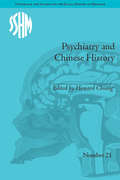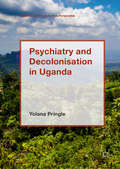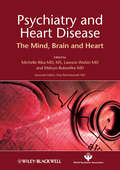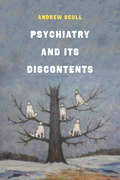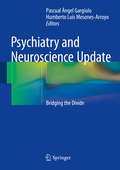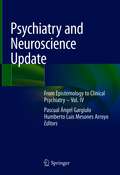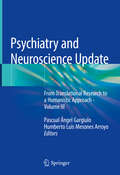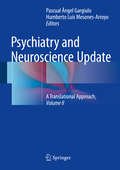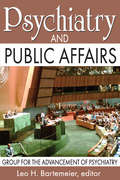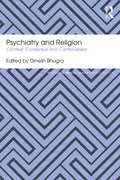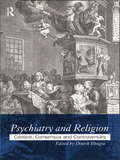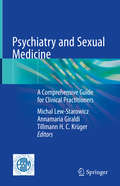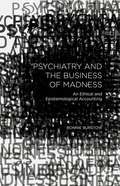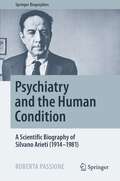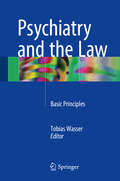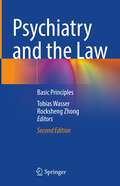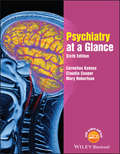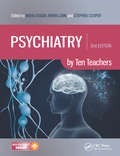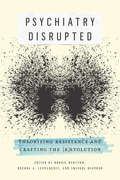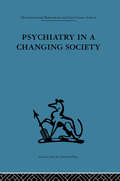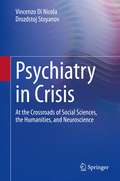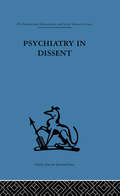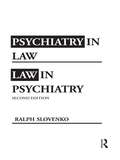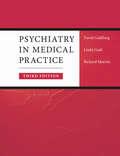- Table View
- List View
Psychiatry and Chinese History (Studies for the Society for the Social History of Medicine #21)
by Howard ChiangThis collection examines psychiatric medicine in China across the early modern and modern periods. Essays focus on the diagnosis, treatment and cultural implications of madness and mental illness and explore the complex trajectory of the medicalization of the mind in shifting political contexts of Chinese history.
Psychiatry and Decolonisation in Uganda (Mental Health in Historical Perspective)
by Yolana PringleThis open access book investigates psychiatry in Uganda during the years of decolonisation. It examines the challenges facing a new generation of psychiatrists as they took over responsibility for psychiatry at the end of empire, and explores the ways psychiatric practices were tied to shifting political and development priorities, periods of instability, and a broader context of transnational and international exchange. At its heart is a question that has concerned psychiatrists globally since the mid-twentieth century: how to bridge the social and cultural gap between psychiatry and its patients? Bringing together archival research with oral histories, Yolana Pringle traces how this question came to dominate both national and international discussions on mental health care reform, including at the World Health Organization, and helped spur a culture of experimentation and creativity globally. As Pringle shows, however, the history of psychiatry during the years of decolonisation remained one of marginality, and ultimately, in the context of war and violence, the decolonisation of psychiatry was incomplete.
Psychiatry and Heart Disease
by Lawson Wulsin Divy Ravindranath Michelle Riba Melvyn RubenfireThis unique book will help psychiatrists to understand better the risks of cardiovascular illness and cardiologists to appreciate possible pathophysiological links with psychiatric conditions. It describes the common psychiatric conditions, their key features and how they may influence cardiovascular disease, outcomes, and quality of life. It also considers the cardiovascular complications that may arise as a result of mental illness. In an exciting, collaborative approach, psychiatrists and cardiologists combine their expertise throughout the book to provide guidance on the best way to manage such patients, considering the patient as a whole, not the individual conditions.
Psychiatry and Its Discontents
by Andrew ScullWritten by one of the world’s most distinguished historians of psychiatry, Psychiatry and Its Discontents provides a wide-ranging and critical perspective on the profession that dominates the treatment of mental illness. Andrew Scull traces the rise of the field, the midcentury hegemony of psychoanalytic methods, and the paradigm’s decline with the ascendance of biological and pharmaceutical approaches to mental illness. The book’s historical sweep is broad, ranging from the age of the asylum to the rise of psychopharmacology and the dubious triumphs of “community care.” The essays in Psychiatry and Its Discontents provide a vivid and compelling portrait of the recurring crises of legitimacy experienced by “mad-doctors,” as psychiatrists were once called, and illustrates the impact of psychiatry’s ideas and interventions on the lives of those afflicted with mental illness.
Psychiatry and Neuroscience Update
by Pascual Ángel Gargiulo Humberto Luis Mesones ArroyoThe intention of this unique title is to bridge the gap between psychiatry and neuroscience, allowing a fruitful dialogue between both sciences. Recognizing that psychiatry has received important contributions from the basic neurosciences and that the basic neurosciences have received inspiration and objectives from the open problems of psychiatry, Psychiatry and Neuroscience: Bridging the Divide is designed to identify the borders, trends and implications in both fields today. Comprehensive and developed by a renowned group of experts from both fields, the book is divided into four parts: Epistemological Considerations About the Study of Normal and Abnormal Human Behaviors; From Basic Neurosciences to Human Brain; Neurosciences, Learning, Teaching and the Role of Social Environment and Explaining Human Pathological Behaviors: From Brain Disorders to Psychopathology. A unique and invaluable addition to the literature in psychiatry and neuroscience, Psychiatry and Neuroscience: Bridging the Divide offers an important and clearer understanding of the relationship between psychiatry and neuroscience.
Psychiatry and Neuroscience Update: From Epistemology to Clinical Psychiatry – Vol. IV
by Pascual Ángel Gargiulo Humberto Luis Mesones ArroyoThis broad and thought-provoking volume provides an overview of recent intellectual and scientific advances that intersect psychiatry and neuroscience, offering a wide range of penetrating insights in both disciplines. The fourth volume on the topic in the last several years from a varying panel of international experts identifies the borders, trends and implications in both fields today and goes beyond that into related disciplines to seek out connections and influences. Similar to its three Update book predecessors, Psychiatry and Neuroscience – Volume IV presents a range of interesting topics in the main disciplines – psychiatry and neuroscience – and attempts to provide deeper comprehension or explication of the normal and diseased human mind, its biological correlates and its biographical and existential implications. This engaging volume continues the previous style of exploring different disciplines and trying to integrate disciplinary evidence from varying points of view in an organic manner. The first section is about epistemological considerations regarding the study of normal and abnormal human behaviors, including, for example, the topic of phenomenological psychopathology and phenomenological psychiatry in relation to schizophrenia and substance misuse, among other topics. Section 2 addresses issues around the translation of basic neuroscience to expression in the human brain and behavioral implications. Section 3 discusses the issues of learning, teaching and the role of social environment in the field of neuroscience. Finally section 4 reviews various perspectives on explaining human pathological behaviors -- from brain disorders to psychopathology.
Psychiatry and Neuroscience Update: From Translational Research to a Humanistic Approach - Volume III
by Humberto Luis Mesones Arroyo Pascual Ángel GargiuloThis broad and thought-provoking volume provides an overview of recent intellectual and scientific advances that bridge the gap between psychiatry and neuroscience, offering a wide range of penetrating insights in both disciplines. The third volume on the topic in the last several years from a varying panel of international experts, this title identifies the borders, trends and implications in both fields today and goes beyond that into related disciplines to seek out connections and influences. Similar to its two Update book predecessors, Psychiatry and Neuroscience – Volume III presents the current state-of-the-art in the main disciplines – psychiatry and neuroscience – and attempts to provide deeper comprehension or explication of the normal and diseased human mind, its biological correlates and its biographical and existential implications. This engaging volume continues the previous style of exploring different disciplines and trying to integrate disciplinary evidence from varying points of view in an organic manner. Developed for clinicians and researchers in the fields of medicine, psychiatry, psychology and biology, this third volume also will be of great interest to students and university professors of diverse disciplines.
Psychiatry and Neuroscience Update - Vol. II
by Pascual Ángel Gargiulo Humberto Luis Mesones-ArroyoThe aim of this unique book is to provide an overview of recent advances bridging the gap between psychiatry and neuroscience, allowing a fruitful dialogue between both sciences. The emerging interactions and mutual contributions between neuroscience and psychiatry are here recognized. This book is designed to identify the borders, trends and implications in both fields today. Comprehensive and developed by a renowned group of experts from both fields, the book is divided into four parts: Epistemological Considerations About the Study of Normal and Abnormal Human Behaviors; From Basic Neurosciences to Human Brain; Neurosciences, Learning, Teaching and the Role of Social Environment; and Explaining Human Pathological Behaviors: From Brain Disorders to Psychopathology. A unique and invaluable addition to the literature in psychiatry and neuroscience, Psychiatry and Neuroscience Update - Vol. II: A Translational Approach offers an important and clearer understanding of the relationship between these two disciplines. This book is directed to students, professionals and researchers of medicine, psychology, psychopedagogy and nursery.
Psychiatry and Public Affairs: Group for the Advancement of Psychiatry
by Leo H. BartemeierThis stimulating collection bears witness to the insight that psychiatrists, with their special training and background and concern for human relationships, can contribute solutions to major problems of public affairs and public policy. The contributors represent the summation and distillation of the best thinking of psychiatry's leaders. They represent a variety of experiences and viewpoints, making possible a many-faceted approach to problems of national and international concern.Based on completely documented reports of individual members and symposium discussions, Psychiatry and Public Affairs examines four major areas of public interest: the social responsibility of psychiatry, emphasizing the psychiatric aspects of school desegregation; psychiatry's role in international relations and understanding cross-cultural communication and working abroad; studies of forceful indoctrination or "brainwashing" and the social and psychiatric implications of the threat of nuclear war.Contributors and contributions included here are "Physical and Social Isolation," Jack Vernon; "Psychiatric Aspects of Chinese Thought Reform," Robert J. Lifton; "Patterns of Reactions to Severe Chronic Stress in American Army POWs to the Chinese," Edgar H. Schein; "The Coming Struggle for More Responsibility," Pare Lorentz; "Some Implications of the Fall-Out Problem," Maurice B. Visscher; "Psychological Aspects of the Nuclear Arms Race," Franklin C. McLean; "Solitary Confinement," Milton Meltzer; and "Sleep Deprivation," David Tyler. Psychiatry and Public Affairs explores ideas and problems on the advancing edge of psychiatry.The Group for the Advancement of Psychiatry (GAP) envisages a continuing program of work according to the following aims: to collect and appraise significant data in the field of psychiatry, mental health, and human relations; to re-evaluate old concepts and to develop and test new ones; and to apply the knowledge thus obtained fo
Psychiatry and Religion: Context, Consensus and Controversies (Routledge Mental Health Classic Editions)
by Dinesh BhugraPsychiatry and Religion: Context, Consensus and Controversies works to eradicate the distinction between spiritual and psychological welfare and promote greater understanding of the relationship between the two. This book brings together chapters from fifteen mental health practitioners and pastoral workers to explore what their different philosophies have to offer the individuals in their care. As well as all the major world religions, the text also provides detailed information about newer religions and the significance of their belief systems for mental health management. The book examines the positive and negative effects that strict moral codes and religious rituals can produce and shows how awareness of these effects is crucial to the treatment of these patients. This classic edition of Psychiatry and Religion, with a new introduction from Dinesh Bhugra, will continue to provide an important resource to practicing and training psychiatrists.
Psychiatry and Religion: Context, Consensus and Controversies (Routledge Mental Health Classic Editions Ser.)
by Dinesh BhugraThe argument of this book is that the divide between psychiatry and religion is an artificial one and that there is much room for understanding the same phenomena from different perspectives. In it thirteen senior mental health professionals and pastoral workers come together to explore what their different philosophies have to offer each other for the benefit of the individuals in their care. The book as a whole: * sets the relationship between psychiatry and religion in historical context * provides detailed information about specific religions and the significance of their belief systems for mental health management * examines the relationship between psychopathology, psychiatry and religion.
Psychiatry and Sexual Medicine: A Comprehensive Guide for Clinical Practitioners
by Michal Lew-Starowicz Annamaria Giraldi Tillmann H. C. KrügerPsychiatry meets sexual medicine! This book explores the links between mental and sexual health and provides guidance for the treatment of the most common sexual problems. The book fills the need of many clinicians and trainees who work in the field of psychiatry and sexual medicine. Offering comprehensive and clearly structured information, case presentations, and key messages this book focuses on sharing essential knowledge and skills of recognized experts in the field. Get inspired by the vivid interactions of psychiatry and sexual medicine and help your patients on their way to improved sexual health!
Psychiatry and the Business of Madness
by Bonnie BurstowPsychiatry and the Business of Madness deconstructs psychiatric discourse and practice, exposes the self-interest at the core of the psychiatric/psychopharmacological enterprise, and demonstrates that psychiatry is epistemologically and ethically irredeemable. Burstow's medical and historical research and in-depth interviews demonstrate that the paradigm is untenable, that psychiatry is pseudo-medicine, that the "treatments" do not "correct" disorders but cause them. Burstow fundamentally challenges our right to incarcerate or otherwise subdue those we find distressing. She invites the reader to rethink how society addresses these problems, and gives concrete suggestions for societal transformation, with "services" grounded in the community. A compelling piece of scholarship, impeccable in its logic, unwavering in its moral commitment, and revolutionary in its implications.
Psychiatry and the Human Condition: A Scientific Biography of Silvano Arieti (1914–1981) (Springer Biographies)
by Roberta PassioneThis book is the result of extensive archival research conducted on the Collection “Silvano Arieti Papers” held in the Manuscript Division of the Library of Congress, Washington, D.C. It offers readers the first scientific biography of the renowned Italian-born psychiatrist Silvano Arieti, who in 1939 emigrated to the United States, where he gained fame and recognition for his work on schizophrenia. In 1975, the second edition of his book, Interpretation of Schizophrenia, received the National Book Award in Science. The book has been cast as a twofold journey: an exploration of the life of a psychiatrist and scientist and an overview of twentieth century psychiatry and its significant issues, debates, and transformations. Readers will find useful insights for a better understanding of psychiatry as a discipline capable of portraying the complexity of human nature.
Psychiatry and the Law
by Tobias WasserThis book is specifically designed for new psychiatrists and all other medical professionals who lack the training necessary to confront the complicated legal and ethical issues that arise at the intersection of the mental health and judicial systems. Written by experts in the field, each chapter begins with a challenging case vignette synthesized from a historical legal case that places the reader in the role of the treatment provider. The text presents details of the legal case, historical significance, and the precedent it set before discussing the core principles of that particular subject area. Each chapter reviews the existing literature and reinforces the most salient points. Topics include risk assessment, substance misuse and the law, legal issues within child and adolescent psychiatry, involuntary medication considerations, and other challenges that are often not sufficiently addressed in training. The text is specifically designed for new psychiatrists and other professionals who are transitioning from their studies into clinical practice, concisely explaining and defining the issues in a practical, reader-friendly tone suitable as both a quick-reference in a busy environment or as a resource for private study. Psychiatry and the Law: Basic Principles is an excellent resource for new psychiatrists, psychologists, social workers, students, and other professionals accommodating medical and legal boundaries in clinical practice.
Psychiatry and the Law: Basic Principles
by Tobias Wasser Rocksheng ZhongThis book is designed to help new psychiatrists and other medical professionals confront the complicated legal and ethical issues that arise at the intersection of the mental health and judicial systems. The law provides the boundaries in which clinical care operates. Appreciating these boundaries is particularly important when working with individuals whose rights may already be curtailed (forensic settings, for example). Understanding how psychiatry and the law interface provides students and trainees with a foundation for building their skills and attitudes through training and beyond. This text can guide or supplement education on the legal regulation of psychiatry, the use of psychiatry to answer legal questions, and the treatment of individuals with criminal justice involvement.In the second edition of this text, the editors have updated several chapters with new information and added chapters covering topics not addressed in the first edition. Each chapter begins witha clinical case vignette that brings the topic to life through a clinical encounter, the majority of which are based on landmark legal cases that set a historical precedent. The text presents details of the legal case, historical significance, and the precedent it set before discussing the core principles of the subject area. Each chapter reviews the existing literature and reinforces the most salient points. Topics include risk assessment, substance misuse and the law, legal issues within child and adolescent psychiatry, involuntary medication considerations, and other challenges that are often not sufficiently addressed in training.Psychiatry and the Law: Basic Principles covers a wide range of topics that would be suitable for use as the basis of a course in forensic psychiatry for psychiatry residents and is an excellent resource for new psychiatrists, psychologists, social workers, students, and other professionals navigating medical and legal boundaries in clinicalpractice.
Psychiatry at a Glance
by Claudia Cooper Cornelius Katona Mary RobertsonPsychiatry at a Glance is an easy-to-use, accessible introductory and study text for all students of psychiatry. It helps develop your skills in history taking and performing the Mental State Examination (MSE), and presents 'need to know' information on the basic science, treatment, and management of the major disorders.This edition features:Thoroughly updated and reorganised artwork, offering greater clarity and easier understanding for those new to the subjectGreater emphasis on history taking and examination - essential for clinical work and clerking patientsNew chapters on mental health capacity and coverage of the Australian and New Zealand health care legislationEven more Extended Matching Questions, brand new Single Best Answer Questions, and sample OSCE stations so you can test your knowledgeA brand new companion website at www.ataglanceseries.com/psychiatry, featuring updated case studies and downloadable illustrations.Psychiatry at a Glance is the ideal companion for anyone about to start a psychiatric attachment or module and will appeal to medical students, junior doctors and Psychiatry trainees as well as nursing students and other health professionals.
Psychiatry by Ten Teachers (Second Edition)
by Stephen Cooper Nisha Dogra Brian LunnPsychiatry by Ten Teachers follows the highly-praised and successful ‘Ten Teachers’ tradition of providing the key information in a chosen specialty as required by the medical undergraduate, junior doctor and trainee GP, written by ten respected experts in the field. With medical students closely involved in the text’s development from the outset the text focuses on what the medical student and junior really need to know, with a clear rationale for the inclusion of every topic discussed at a level appropriate for the inexperienced, and will be of value to their future career whatever field they ultimately decide to specialize in. Completely up to date, this revised second edition encourages students and recently qualified doctors to get the most out of their psychiatry and community attachments, without overwhelming them with unnecessary detail. In line with the core curriculum recommended by the Royal College of Psychiatry, useful tips and advice ensure this is much more than a standard introduction to the subject, encouraging additional reading, supporting critical thinking and bringing exam success.
Psychiatry Disrupted: Theorizing Resistance and Crafting the (R)evolution
by Bonnie Burstow Brenda A. LeFrançois Shaindl DiamondThere is growing international resistance to the oppressiveness of psychiatry. While previous studies have critiqued psychiatry, Psychiatry Disrupted goes beyond theorizing what is wrong with it to theorizing how we might stop it. Introducing readers to the arguments and rationale for opposing psychiatry, the book combines perspectives from anti-psychiatry and critical psychiatry activism, mad activism, antiracist, critical, and radical disability studies, as well as feminist, Marxist, and anarchist thought. The editors and contributors are activists and academics - adult education and social work professors, psychologists, prominent leaders in the psychiatric survivor movement, and artists - from across Canada, England, and the United States. From chapters discussing feminist opposition to the medicalization of human experience, to the links between psychiatry and neo-liberalism, to internal tensions within the various movements and different identities from which people organize, the collection theorizes psychiatry while contributing to a range of scholarship and presenting a comprehensive overview of resistance to psychiatry in the academy and in the community. Contributors include Simon Adam (University of Toronto), Rosemary Barnes University of Toronto, Peter Beresford (Brunel University), Bonnie Burstow (University of Toronto), Chris Chapman (York University), Mark Cresswell (Durham University), Shaindl Diamond (York University), Chava Finkler (Memorial University), Ambrose Kirby (therapist in private practice, Brenda A. LeFrançois (Memorial University of Newfoundland), Mick McKeown (University of Central Lancashire), Robert Menzies (Simon Fraser University), China Mills (Oxford University), Tina Minkowitz (World Network of Users and Survivors of Psychiatry), Ian Parker (University of Leicester), Susan Schellenberg, Helen Spandler (University of Central Lancashire), and AJ Withers (York University). A courageous anthology, Psychiatry Disrupted is a timely work that asks compelling activist questions that no other book in the field touches.
Psychiatry Disrupted
by Brenda A. Lefrançois Bonnie Burstow Shaindl DiamondThere is growing international resistance to the oppressiveness of psychiatry. While previous studies have critiqued psychiatry, Psychiatry Disrupted goes beyond theorizing what is wrong with it to theorizing how we might stop it. Introducing readers to the arguments and rationale for opposing psychiatry, the book combines perspectives from anti-psychiatry and critical psychiatry activism, mad activism, antiracist, critical, and radical disability studies, as well as feminist, Marxist, and anarchist thought. The editors and contributors are activists and academics - adult education and social work professors, psychologists, prominent leaders in the psychiatric survivor movement, and artists - from across Canada, England, and the United States. From chapters discussing feminist opposition to the medicalization of human experience, to the links between psychiatry and neo-liberalism, to internal tensions within the various movements and different identities from which people organize, the collection theorizes psychiatry while contributing to a range of scholarship and presenting a comprehensive overview of resistance to psychiatry in the academy and in the community. Contributors include Simon Adam (University of Toronto), Rosemary Barnes University of Toronto, Peter Beresford (Brunel University), Bonnie Burstow (University of Toronto), Chris Chapman (York University), Mark Cresswell (Durham University), Shaindl Diamond (York University), Chava Finkler (Memorial University), Ambrose Kirby (therapist in private practice, Brenda A. LeFrançois (Memorial University of Newfoundland), Mick McKeown (University of Central Lancashire), Robert Menzies (Simon Fraser University), China Mills (Oxford University), Tina Minkowitz (World Network of Users and Survivors of Psychiatry), Ian Parker (University of Leicester), Susan Schellenberg, Helen Spandler (University of Central Lancashire), and AJ Withers (York University). A courageous anthology, Psychiatry Disrupted is a timely work that asks compelling activist questions that no other book in the field touches.
Psychiatry in a Changing Society
by S H Foulkes G Stewart PrinceTavistock Press was established as a co-operative venture between the Tavistock Institute and Routledge & Kegan Paul (RKP) in the 1950s to produce a series of major contributions across the social sciences. This volume is part of a 2001 reissue of a selection of those important works which have since gone out of print, or are difficult to locate. Published by Routledge, 112 volumes in total are being brought together under the name The International Behavioural and Social Sciences Library: Classics from the Tavistock Press. Reproduced here in facsimile, this volume was originally published in 1969 and is available individually. The collection is also available in a number of themed mini-sets of between 5 and 13 volumes, or as a complete collection.
Psychiatry in Crisis: At the Crossroads of Social Sciences, the Humanities, and Neuroscience
by Vincenzo Di Nicola Drozdstoj StoyanovThe field of academic psychiatry is in crisis, everywhere. It is not merely a health crisis of resource scarcity or distribution, competing claims and practice models, or level of development from one country to another, but a deeper, more fundamental crisis about the very definition and the theoretical basis of psychiatry. The kinds of questions that represent this crisis include whether psychiatry is a social science (like psychology or anthropology), whether it is better understood as part of the humanities (like philosophy, history, and literature), or if the future of psychiatry is best assured as a branch of medicine (based on genetics and neuroscience)? In fact, the question often debated since the beginning of modern psychiatry concerns the biomedical model so that part of psychiatry’s perpetual self-questioning is to what extent it is or is not a branch of medicine. This unique and bold volume offers a representative and critical survey of the history of modern psychiatry with deeply informed transdisciplinary readings of the literature and practices of the field by two professors of psychiatry who are active in practice and engaged in research and have dual training in scientific psychiatry and philosophy. In alternating chapters presenting contrasting arguments for the future of psychiatry, the two authors conclude with a dialogue between them to flesh out the theoretical, research, and practical implications of psychiatry’s current crisis, outlining areas of divergence, consensus, and fruitful collaborations to revision psychiatry today. The volume is scrupulously documented but written in accessible language with capsule summaries of key areas of theory, research, and practice for the student and practitioner alike in the social and human sciences and in medicine, psychiatry, and the neurosciences.
Psychiatry in Dissent: Controversial issues in thought and practice second edition
by Anthony ClareTavistock Press was established as a co-operative venture between the Tavistock Institute and Routledge & Kegan Paul (RKP) in the 1950s to produce a series of major contributions across the social sciences. This volume is part of a 2001 reissue of a selection of those important works which have since gone out of print, or are difficult to locate. Published by Routledge, 112 volumes in total are being brought together under the name The International Behavioural and Social Sciences Library: Classics from the Tavistock Press. Reproduced here in facsimile, this volume was originally published in 1980 and is available individually. The collection is also available in a number of themed mini-sets of between 5 and 13 volumes, or as a complete collection.
Psychiatry in Law / Law in Psychiatry, Second Edition
by Ralph SlovenkoPsychiatry in Law/Law in Psychiatry, 2nd Edition, is a sweeping, up-to-date examination of the infiltration of psychiatry into law and the growing intervention of law into psychiatry. Unmatched in breadth and coverage, and thoroughly updated from the first edition, this comprehensive text and reference is an essential resource for psychiatry residents, law students, and practitioners alike.
Psychiatry in Medical Practice
by Prof David Goldberg Linda Gask Richard MorrissThis fully updated third edition of Psychiatry in Medical Practice takes into account major changes in medical education since 1994. New sections provide information on problem-based learning and observed structured clinical examinations. Divided into four sections, this book covers: clinical approaches to the patient syndromes of disorder disorders related to stages of the life cycle services, ethics and the law. As well as retaining the key features of the previous editions, this book includes two brand new chapters on risk assessment and the Mental Health Service. A handy portable reference card is also included; this has been updated to incorporate a scale for assessing cerebral impairment in the elderly, and a new assessment of suicidal risk scale. This highly practical book is an essential guide for all medical students and doctors in training who are involved with psychiatry. It is also a useful reference tool for those who are more experienced in the field.
